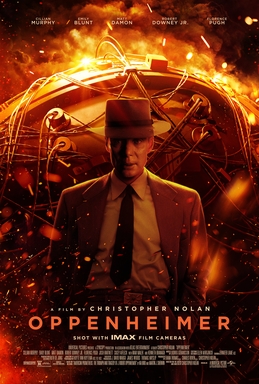
Please follow us on Gab, Minds, Telegram, Rumble, Truth Social, Gettr, Twitter
J. Robert Oppenheimer: I don't know if we can be trusted with such a weapon. But I know the Nazis can't .~ from Oppenheimer (2023)
While the story is told in pieces like shattered glass, moving forward and backward in time, from the chaos there emerges an important conversation about the morality of the use of weapons of mass destruction. Society is depicted in a free fall, as if western civilization is being blown to bits in slow motion. The world wavers between the twin tyrannies of Communism and Fascism. Similarly, the life of the Father of the Atomic Bomb is rife with controversies, misspent passions, and interior torments which all serve to make his genius more spectacular. Oppenheimer, more than anyone else, was conscious of the fact that while the atomic bomb helped to end World War II, it truly opened a Pandora's box of endless perils. The final question is that if the discovery and use of atomic energy was inevitable, should the technology be in the hands of America or in the hands of her enemies?
There has been a great deal of talk on the internet about the brief sex scenes in the film, scenes which were mostly unnecessary. They depicted Oppenheimer (Cillian Murphy) with his mistress, the Communist Jean Tatlock (Florence Pugh); the relationship seems oddly passionless and utilitarian. Jean shuns romance or commitment, like the good Bolshevik she is, and other than an intellectual connection she and Oppie are just using each other for fleeting gratification. The first sex scene flashed by so quickly that it was easy to miss, and I did miss it by exiting to let the cat out, returning to hear the words: "You are become Death and the destroyer of worlds."
The later scenes were brief as well, with an odd perfunctory interaction between Oppie and Jean, just sitting around naked and talking, as if love and sex were bourgeois and boring. But that is what Communists are all about: scorn for middle class pleasures. There is nudity from the waist up; personally I find Florence Pugh more scandalous in some of her publicity stills. Nevertheless, the crass sexuality is linked to the new ability to create bombs that are able to blow up the world. When the sacredness and mystery of the human person is violated, there is nothing beyond that but the mystery of death.
Meanwhile, Oppenheimer's relationship with his wife Kitty (Emily Blunt), although they are never shown unclothed, is a thousand times more passionate just by the way they look at each other, seeming to read each other's minds. Oppie's huge mistake was seeing Jean after his marriage to Kitty, which seemed to trigger Jean's mental instability, possibly leading to her suicide. And the past Communism of both his women returns to haunt him.
All of what I just wrote about is a mere fraction of the film, most of which is quite avuncular, dealing with the morality of weapons of mass destruction and the impact of the mere existence of such weapons on humanity. Oppenheimer contains some mesmerizingly profound performances, the most obvious being that of Cillian Murphy, who makes you forget he comes from County Cork as he disappears into the character of the tormented Jewish physicist who realizes he is on the verge of handing over to politicians the power to destroy civilization. Matt Damon is good as General Leslie Groves, who hires Oppenheimer to build the bomb.
The film pulls together a lot of historical events and personages, making for a more coherent understanding of the end of World War II and of the Cold War, for me, at any rate. I watched the film with a person who came of age during the Cold War and she found the film compellingly authentic in its representations. As a work of art and of historical fiction, it excels.